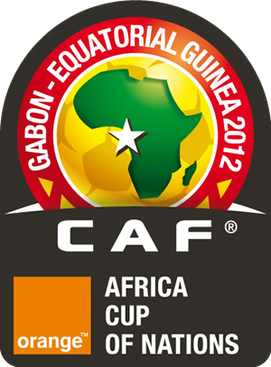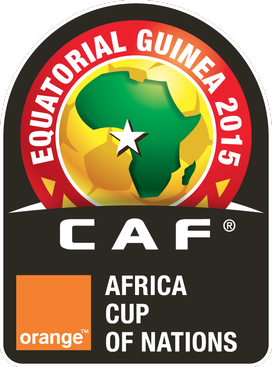The Ivory Coast national football team represents Ivory Coast in men's international football. Nicknamed the Elephants, the team is managed by the Ivorian Football Federation (FIF). The team has won the Africa Cup of Nations three times, in 1992, 2015 and 2023, and has qualified for the FIFA World Cup three times, in 2006, 2010, and 2014.
The Zambia national football team represents Zambia in association football and is governed by the Football Association of Zambia (FAZ). During the 1980s, they were known as the KK 11, after founding president Dr. Kenneth Kaunda ("KK") who ruled Zambia from 1964 to 1991. After the country adopted multiparty politics, the side was nicknamed Chipolopolo which means the "Copper Bullets". The team won an Africa Cup of Nations title in 2012. This team has also become the only most successful team in the COSAFA Cup, surpassing Zimbabwe after winning the 2023 edition.
The Gabon national football team represents Gabon in men's international football. The team's nickname is The Panthers and it is governed by the Gabonese Football Federation. They have never qualified for the FIFA World Cup, but have qualified eight times for the Africa Cup of Nations. Gabon is a member of both FIFA and Confederation of African Football (CAF).
The Equatorial Guinea national football team represents Equatorial Guinea in men's international football and is controlled by the Equatoguinean Football Federation, a member of the Confederation of African Football (CAF).

The 2010 Africa Cup of Nations, also known as the Orange Africa Cup of Nations for sponsorship reasons, was the 27th Africa Cup of Nations, the biennial football championship of Africa (CAF). It was held in Angola, where it began on 10 January 2010 and concluded on 31 January.

The 2012 Africa Cup of Nations, also known as the Orange Africa Cup of Nations for sponsorship reasons, was the 28th edition of the Africa Cup of Nations, the football championship of Africa organized by the Confederation of African Football (CAF).
Christopher Katongo is a Zambian former professional footballer who played as a striker. At international level, he amassed over 100 caps between 2003 and 2016 for the Zambia national team. He is an Africa Cup of Nations winner and won the BBC's African Footballer of the Year award in 2012, winning just over 40% of the public vote. His win is stated to have inspired a number of young players in Zambia.

Emmanuel Mayuka is a Zambian professional footballer who plays as a striker for the NAPSA Stars and the Zambia national team. He was the top scorer of the 2012 Africa Cup of Nations.
The 2013 Africa Cup of Nations qualification was the qualification process for the 2013 Africa Cup of Nations, the 29th edition of the Africa Cup of Nations tournament. South Africa automatically qualified as the host country.

The 2015 Africa Cup of Nations, known as the Orange Africa Cup of Nations, Equatorial Guinea 2015 for sponsorship reasons, was the 30th staging of the Africa Cup of Nations, the international men's football championship of Africa. It was organized by the Confederation of African Football (CAF) and was held from 17 January to 8 February 2015.

The African Nations Championship, known for sponsorship purposes as the TotalEnergies African Nations Championship and commonly abbreviated as CHAN, is a biennial African association football tournament organized by the Confederation of African Football (CAF) since 2009 and first announced on 11 September 2007. The participating nations must consist of players playing in their national league competitions.
This page details the qualifying process for the 1990 African Cup of Nations in Algeria. Algeria, as hosts, and Cameroon, as title holders, qualified automatically.
This is a list of records and statistics of the Africa Cup of Nations.
The 2015 Africa Cup of Nations qualification matches determined the participating teams for the 2015 Africa Cup of Nations.

The 2023 Africa Cup of Nations, known in short as the 2023 AFCON or CAN 2023 and for sponsorship purposes as the TotalEnergies 2023 Africa Cup of Nations, was the 34th edition of the biennial Africa Cup of Nations tournament organised by the Confederation of African Football (CAF). It was hosted by Ivory Coast, taking place in the country for the second time following the 1984 edition.
Group I of the 2017 Africa Cup of Nations qualification tournament was one of the thirteen groups to decide the teams which qualified for the 2017 Africa Cup of Nations finals tournament. The group consisted of three teams: Ivory Coast, Sudan, and Sierra Leone. The hosts of the final tournament, Gabon, had also been drawn into this group and played games against the other three teams in the group; however, these matches were only considered as friendlies and not counted for the standings.
The 2018 African Nations Championship qualification was a men's football competition which decided the participating teams of the 2018 African Nations Championship. Only national team players who were playing in their country's own domestic league were eligible to compete in the tournament.
Group C of the 2019 Africa Cup of Nations qualification tournament was one of the twelve groups to decide the teams which qualified for the 2019 Africa Cup of Nations finals tournament. The group consisted of four teams: Mali, Gabon, Burundi, and South Sudan.
Qualification for the 2022 Women's Africa Cup of Nations began with the first round during the week of 18–26 October 2021 and concluded with the second during the week of 14–23 February 2022. For the first time in the tournament's history, 12 teams, including hosts (Morocco), qualified to play in the group stages.
Ivory Coast is one of Africa's major forces in the Africa Cup of Nations. Ivory Coast has won the tournament three times, most recently as hosts in 2023. They previously won in 1992 and 2015. Ivory Coast has also finished as runner up twice, in 2006 and 2012.






